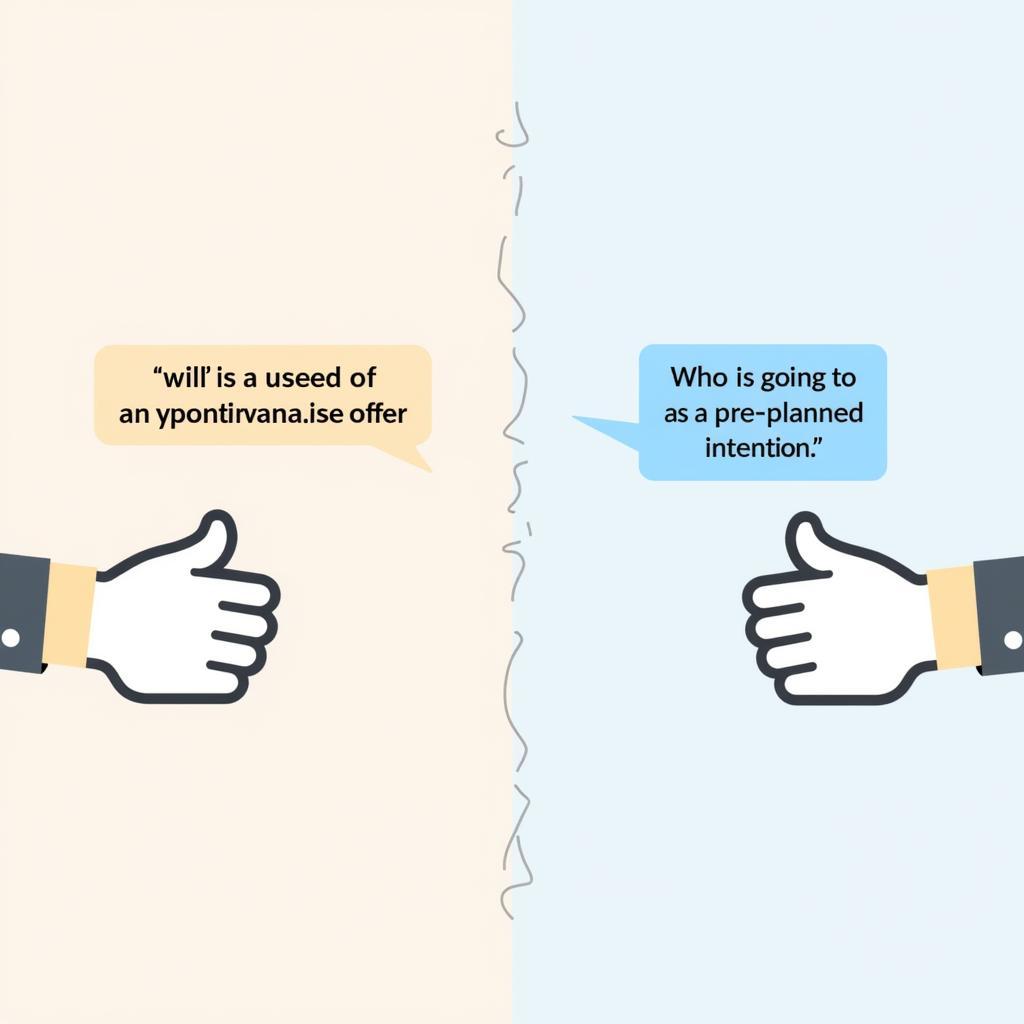Will vs. going to—two seemingly simple future tenses that often trip up English learners. This guide dives deep into their nuances, providing clear explanations and practical examples to help you confidently choose the right tense every time. We’ll explore the core differences, common usage scenarios, and even delve into some subtle exceptions. Let’s unravel the mystery behind these essential English tenses.
When to Use “Will”
“Will” is your go-to for spontaneous decisions, predictions, and promises. Imagine a sudden downpour—you might say, “I think I’ll grab an umbrella.” That’s a spontaneous decision. Predicting the outcome of a football match? “Liverpool will win the league.” A promise to a friend? “I’ll call you later.” These scenarios all call for “will.” “Will” is also used for formal announcements and offers of help, such as “The meeting will commence at 9 am” or “I’ll carry your bags.”
 Using Will in English
Using Will in English
When to Use “Going To”
“Going to” signifies premeditation and planned actions. Think about a holiday you’ve booked—”I’m going to visit Italy next month.” That’s a plan. Noticeable signs also trigger “going to.” Dark clouds gathering? “It’s going to rain.” That’s based on evidence. “Going to” also expresses intentions, as in “I’m going to learn Spanish this year.” This implies a decision already made.
 Using Going To in English
Using Going To in English
Will vs. Going To: Tricky Situations
Sometimes, the lines blur. “I’ll help you” and “I’m going to help you” can both sound correct. The subtle difference lies in the level of commitment. “Will” implies a more spontaneous offer, while “going to” suggests a stronger, pre-existing intention. This nuance often comes down to context and speaker intent.
What’s the difference between “will” and “going to” for predictions?
Both can predict the future, but “going to” is based on present evidence, while “will” relies on general assumptions. “Look at those clouds! It’s going to rain” versus “I think it will rain tomorrow.”
How do I use “will” and “going to” in questions?
Simply invert the subject and auxiliary verb: “Will you go to the party?” or “Are you going to go to the party?” Both are acceptable, with subtle differences in nuance.
Can I use “will” for scheduled events?
Yes, for formally scheduled events, “will” is appropriate. “The train will depart at 10:30 am.”
Mastering the Nuances: Expert Insights
According to linguist Dr. Anna Nguyen, “Understanding the subtle differences between ‘will’ and ‘going to’ elevates your English fluency, allowing for more precise and natural communication.” This highlights the importance of mastering these seemingly small, yet significant distinctions.
 Distinguishing Between Will and Going To
Distinguishing Between Will and Going To
Conclusion
Mastering “will vs. going to” is key to clear communication. By understanding their distinct uses, you can confidently navigate future tenses and express yourself with accuracy and nuance. Practice consistently, and you’ll soon find yourself using these essential tenses like a pro. Remember to keep these distinctions in mind as you continue your English language journey!
will vs going to multiple choice exercises
the present simple vs the present continuous
FAQ
-
What is the main difference between “will” and “going to”?
“Will” is for spontaneous decisions and predictions, while “going to” is for planned actions and predictions based on evidence. -
Can I use “going to” for promises?
Generally, “will” is preferred for promises. -
Is “going to” more formal or informal than “will”?
Neither is inherently more formal or informal. The context dictates the formality. -
How can I practice using “will” and “going to” correctly?
Try writing sentences about your plans and predictions, using both tenses. -
What should I do if I’m still confused?
Refer to grammar resources and practice exercises, or consult a language tutor. -
Can I use both “will” and “going to” interchangeably sometimes?
While there are overlapping instances, using them interchangeably can sometimes change the meaning subtly. -
What is the best way to remember the difference between “will” and “going to”?
Focus on the core difference: spontaneous vs. planned.
More Resources and Exercises
Explore our website for more articles on English grammar, including practice quizzes and exercises to solidify your understanding of “will” and “going to.” You might also be interested in articles on other tense comparisons, such as the present simple vs. present continuous.
Khi cần hỗ trợ hãy liên hệ Số Điện Thoại: 02838172459, Email: truyenthongbongda@gmail.com Hoặc đến địa chỉ: 596 Đ. Hậu Giang, P.12, Quận 6, Hồ Chí Minh 70000, Việt Nam. Chúng tôi có đội ngũ chăm sóc khách hàng 24/7.